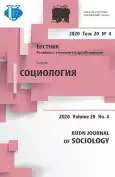Bureaupathology and paper pressing in the Russian education
- Authors: Osipov A.M.1,2
-
Affiliations:
- Hertzen Russian State Pedagogical University
- Yaroslav-the-Wise Novgorod State University
- Issue: Vol 20, No 4 (2020)
- Pages: 953-966
- Section: Sociology of Education
- URL: https://journal-vniispk.ru/2313-2272/article/view/322914
- DOI: https://doi.org/10.22363/2313-2272-2020-20-4-953-966
- ID: 322914
Cite item
Full Text
Abstract
The redundancy, intensity and formalization of ‘paperwork’ in education have become its painful feature: educational bureaucracy and ‘evaluation mania’ ignore the social mission of education, paper pressure and paper genocide are barriers to its progress and manageability. The article presents the results of an interregional study of managerial information flows in the Russian education system: it analyzes data of representative surveys and timing of the workloads of the main personnel groups, expert assessments, document flows in the education system in the perspective of the theory of bureaucracy and institutional functions of education. Thus, the redundancy of information flows in the school system exceeds the functional needs of management by more than 20 times. The number of the types of documents written by the teacher reaches 95 on average, and their labor intensity is comparable to teaching. Most of the collected information is not reliable and is not used for educational purposes; it is rather a means to ensure the managerial omnipotence and excess personnel. The key source of paper pressure and paper genocide in the education system is the management strategy that ignores the social mission of education and its social efficiency. This strategy expresses bureaucratic distrust to educators and to the possibilities of public-private administration. Practices based on this strategy lead to irrelevant, unreliable and ineffective information flows, deformed social relations and professional culture of teachers, their widespread burnout and outflow from education. The identified management strategy is a dead end for the Russian education system and an obstacle for preserving its potential and development under the growing global competition.
About the authors
A. M. Osipov
Hertzen Russian State Pedagogical University; Yaroslav-the-Wise Novgorod State University
Author for correspondence.
Email: osipov.al58@gmail.com
доктор социологических наук, профессор кафедры социологии Российского государственного педагогического университета им. А.И. Герцена; главный научный сотрудник Новгородского государственного университета им. Ярослава Мудрого
Moika River Emb., 48, Saint Petersburg, 191186, Russia; B. St. Petersburg St., 41, Veliky Novgorod, 173003, RussiaReferences
- Byurokratiya v sovremennom mire: teoriya i realii zhizni [Bureaucracy in the Contemporary World: Theory and Reality]. Ed. by V.N. Shevchenko. Moscow; 2009 (In Russ.).
- Weber M. Politika kak prizvanie i professia [Politics as a vocation]. Izbrannye proizvedenija. Moscow; 1990 (In Russ.).
- Hegel G.W.F. Filosifiya prava [Philosophy of Law]. Moscow; 1990 (In Russ.).
- Globalnaya sotsiologiya obrazovaniya [Global Sociology of Education]. Ed. by A.M. Osipov. Veliky Novgorod; 2015 (In Russ.).
- Informatsiya v upravlenii obrazovaniem: teoreticheskie problemy [Information in Educational Management: Theoretical Issues]. Ed. by A.M. Osipov, P.A. Boyadjieva. Saint Petersburg; 2019 (In Russ.).
- Marx K. K kritike gegelevskoi filosofii prava [Contribution to the critique of Hegel’s philosophy of law]. Marx K., Engels F. Sochineniya. Moscow; 1955. Vol. 1 (In Russ.).
- Merton R. Sotsialnaya teoriya i sotsialnaya struktura [Social Theory and Social Structure]. Moscow; 2006 (In Russ.).
- Osipov A.M. Uchitelstvo v kontekste sotsiologii obrazovaniya [Teachers in the context of sociology of education]. Sotsiologicheskie Issledovania. 2018; 3 (In Russ.).
- Osipov A.M. “Troyanskie koni” neoliberalizma v obrazovanii [“Trojan horses” of neoliberalism in education]. Sotsiologicheskie Issledovaniya. 2017; 8 (In Russ.)
- Osipov A.M., Ivanova V.A. Institutsionalnye funktsii - porogovaya problema sotsiologii obrazovaniya [Institutional functions - a threshold challenge of contemporary sociology of education]. Sotsiologicheskie Issledovaniya. 2016; 1 (In Russ.).
- Otkrytost gosudarstva v Rossii [Openness of the State in Russia. Expert Report]. URL: http://audit.gov.ru/page/government-openness (In Russ.).
- Sotsiologiya obrazobaniya [Sociology of Education]. Ed. by A.M. Osipov. Moscow; 2019 (In Russ.).
- Sheregi F.E. Pedagogi obshcheobrazovatelnykh organizatsiy: trud ili povinnost? [Teachers of educational organizations: Labor or duty?]. Sotsiologicheskie Issledovaniya. 2016; 1 (In Russ.).
- Bennett J.T., Johnson M.H. Paperwork and bureaucracy. Economic Inquiry. 1979; 17 (3).
- Entzioni A. The Semi-Professions and Their Organization: Teachers, Nurses, Social Workers. New York; 1969.
- Fitzgerald T. The tyranny of bureaucracy. Educational Management Administration & Leadership. 2009; 37 (1).
- Hartman E. The shadow sovereigns of global education policy: A critique of the world society approach. Journal of Education Policy. 2019; October.
- Kvachev V. From Weberian bureaucracy to networking bureaucracy. Russian Sociological Review. 2019; 18 (2).
- Lee E.M. “Where people like me don’t belong”: Faculty members from low-socioeconomic-status backgrounds. Sociology of Education. 2017; 90 (3).
- Lumby J. Distributed leadership and bureaucracy. Educational Management Administration & Leadership. 2017; 47 (1).
- McGinn N. The impact of supranational organizations on public education. International Journal of Educational Development. 1994; 14 (3).
- Parlar H., Cansoy R. The effect of bureaucratic school structure on teacher leadership culture: A mixed study. Educational Sciences: Theory and Practice. 2017; 17 (6).
- Saks M.M., Adams T.L. Neo-Weberianism, professional formation and the state: Inside the black box. Professions and Professionalism. 2019; 9 (2).
- Serpa S., Ferreira C.M. The concept of bureaucracy by Max Weber. International Journal of Social Science Studies. 2019; 7 (2).
- Spector H. Bureaucratization, education and the meanings of responsibility. Curriculum Inquiry. 2018; 48 (5).
- Wronowski M.L., Urick A. Examining the relationship of teacher perception of accountability and assessment policies on teacher turnover during NCLB. Educational Policy Analysis Archives. 2019; 27.
Supplementary files









